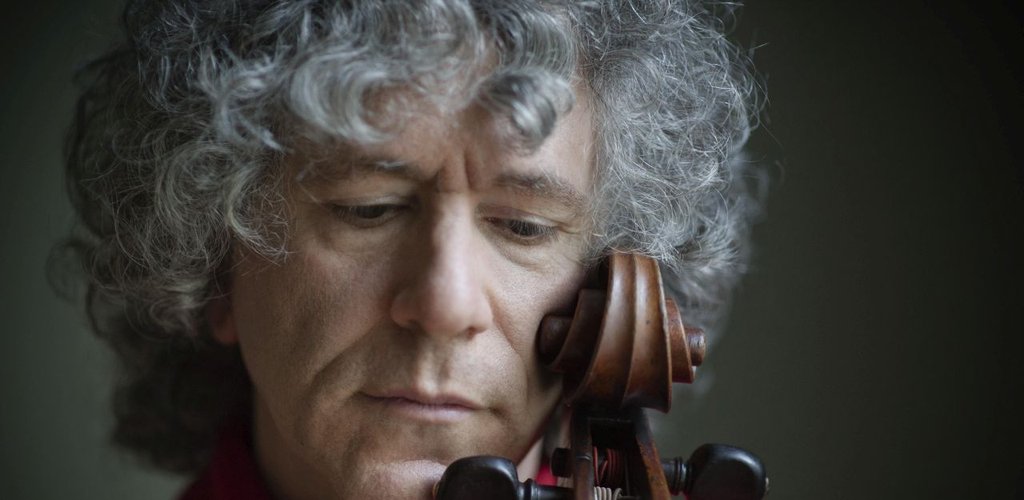The challenging double concerto of our upcoming Brahms concert will be performed by the Budapest Festival Orchestra with two exceptional soloists, violinist Veronika Eberle and cellist Steven Isserlis. We talked to Isserlis, the multi-faceted legend and Gramophone Hall of Fame member about special instruments and special musical and musician friendships.
Júlia Váradi: Learning about your wonderful life, I have the feeling, you have some common characteristics with Iván Fischer. I would first mention the Concert for Humanity organised by the pianist Iddo Bar-Shai, where Israeli and Palestinian peace activists were giving speeches, and you took part, opening the concert with the first movement of Schumann’s piano quintet, with Martha Argerich. Iván did almost the same recently in Hungary, reacting on the same terrible occasion in Israel. But also, those many different issues you are dealing with beside playing the cello, like teaching, composing, writing and moderating. This also remembers me on Iván Fischer’s activities. Am I right, that there is some parallelism?
Steven Isserlis: I certainly feel very close to Iván, in musical terms! Not that I’ve achieved his vast range of accomplishments, of course – but in terms of our education I have been very strongly influenced by great Hungarian musicians such as Sándor Végh, Ferenc Rados and György Kurtág, our attitudes to different styles in music, etc, I feel that we’re much on the same side. And of course, Iván started as a cellist!
J. V.: You identify yourself on your website as “first of all cellist, author, musical explorer and general enthusiast”. If you don’t mind, I would be happy to get explanations for all these activities and behaviour.
S. I.: Well, I love to play a large range of repertoire, with the works of Bach, Beethoven, Schumann, etc at its core. But also including some contemporary music, little-known pieces from the cello and chamber repertoire. I love to discover rarities and to try to introduce them into the repertoire. As an author I have written four books – two for children (about six great composers per book), one for young musicians (with “talented co-author” called Robert Schumann!) And one for all music-lovers about the Bach cello suites. I have also written the text for three children’s stories, with music by Anne Dudley; to my delight, my great friend Izabella Simon has translated them into Hungarian and has performed them quite often in Hungary.
J. V.: It is well known that you are very much interested in historic performances. I learned e.g. that you took part in a special performance with Sir András Schiff at the Beethoven Haus in Bonn, using Beethoven’s own cello. How was it playing on that cello? Did it sound different?
S. I.: It’s beautiful! Quite soft- but very special. I remember that when András Schiff first arranged for me to play on it, another Hungarian friend, Dénes Várjon was there, listening. He was really moved by the quality of the cello’s sound, as well as by its history.
J. V.: This time in Hungary at the Budapest concert you will play the Double Concerto for violin and cello in A Minor. Could you give us some background about that piece?
S. I.: Well, if a piece of music can be said to be about something, I would say that the Brahms Double concerto is about friendship. Written as a piece, offering to the violinist Joseph Joachim after many years’ estrangement between the two men. The music contains many private messages – including some Hungarian motifs, reminiscent of Joachim’s own Hungarian concerto.
J. V.: Have you played with Veronika Eberle already? She is going to play on a Stradivarius from 1693. What kind of cello are you going to use?
S. I.: I’ll be playing on the Marquis De Corberon Strad of 1726. Yes, Veronika and I have played the Brahms Double together before. I am very much looking forward to our reunion – apart from being a wonderful musician, she is one of the loveliest people that I know.
How do you prepare for Budapest?
S. I.: I am always particularly happy to come to Budapest, not only because it gives me a chance to see very special friends, such as Dénes and Iza, his wife, (if they are not away travelling, of course). But also, to visit my older friends and mentors, György Kurtág and Ferenc Rados. I am lucky enough to have been the recipient of four new pieces by Kurtág, while with Rados I played many concerts, covering a lot of the standard repertoire. They both are great men!
